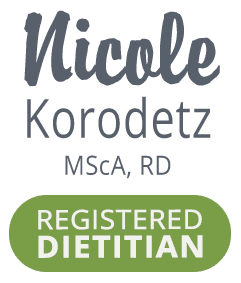Registered Dietitians are considered experts in the field of food and nutrition. Our job is to look at the science and evidence surrounding food, nutrients and health conditions, and translate that information into practical tips that our patients can follow to support their health goals.
We can work in a variety of settings, such as hospitals, long term care, family health teams, in the community, industry, media, private practice and more. We can help people with weight management, managing a chronic condition (e.g. diabetes, hypertension, high cholesterol, kidney or liver disease, autoimmune conditions, etc.), digestive health (e.g. IBS, IBD, food allergies/sensititivies), nutrition through the lifecycle (e.g. pediatrics, pre- & postnatal, seniors), sports nutrition, eating disorders/disordered eating, adapting to a new eating pattern (e.g. vegetarian/vegan, gluten free, keto), to support mental health and much more! Nutrition plays a vital role in everyone’s lives and that’s where dietitians come in.
We empower our clients and community to manage their heath through nutrition education and counselling, meal planning, skill development, goal setting, and overcoming barriers to change in a patient-centered way.
The titles “Dietitian” or “Registered Dietitian” are protected by law. This means that only someone who has met specific educational and professional requirements is legally allowed to use these titles, or the initials, RD, P.Dt, and Dt.P.
All Registered Dietitians in Ontario are members of the College of Dietitians of Ontario (every province has its own college). As a member of the college, a Registered Dietitian must practice according to set standards and laws that protect the public, just like you would expect from doctors, nurses, pharmacists and other health professions. If you felt that a dietitian was not practicing in an ethical way, you could report them to the college for review.
The terms “nutritionist” or “registered nutritionist” are not protected terms in Ontario (they are in some provinces). This means that anybody can call themselves a nutritionist and there are no legal standards for their quality of care.
(Source: eatrightontario.ca)
The initial visit is 1 hour long. Most of the visit is spent gathering the necessary background information that I need to create an individualized nutrition care plan. This information includes your medical history, lifestyle habits, diet history, eating habits and preferences, and barriers to acheiving your health goals. The invidiualized approach is one benefit of working with a dietitian, compared to getting nutrition infomation or a meal plan online. The client shares their expectations for working together. We will set a few goals or action steps to work on until the next visit. You will be sent a consent form and a short intake form to fill out online prior to the visit, but there is no need to prepare anything else for your first session.
Dietitians working in private practice are not covered under OHIP. Many people have dietitian services covered under their employee health insurance plan and are advised to inquire with their provider regarding the amount covered (most cover $500 per year at 80-100%). Dietitian services may also be covered under a health spending account. Fees are HST exempt. At this time, I do not offer direct billing, but you will receive an invoice after each session with the necessary information required to submit to your insurance company for reimbursement.
